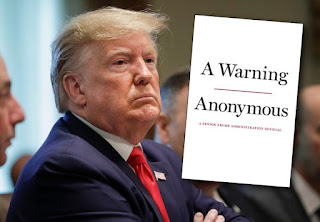The Trump
administration has filed a lawsuit to learn the identity of … not the whistleblower,
but the senior administration official who is set to publish, A Warning, under anonymous authorship.
Here is a brief recitation of the law in this area.
The
Supreme Court of the United States has recognized that First Amendment
protection extends to some anonymous speech. For example, there is McIntyre v.
Ohio Elections Comm'n, (1995) (While “[a]nonymous pamphlets, leaflets,
brochures and even books have played an important role in the progress of
mankind[,] ... [t]he freedom to publish anonymously extends beyond the literary
realm.”). The Court said: “[A] decision in favor of anonymity may be motivated
by fear of economic or official retaliation, by concern about social ostracism,
or merely by a desire to preserve as much of one's privacy as possible.” Whatever
the motivation, “an author's decision to remain anonymous, like other decisions
concerning omissions or additions to the content of a publication, is an aspect
of the freedom of speech protected by the First Amendment.”
Other
courts have agreed: Doe v. Cahill (Del.2005): “It [also] is clear that speech
over the internet is entitled to First Amendment protection [and that] [t]his
protection extends to anonymous internet speech.” The case cited Reno v. ACLU (1997)
(“There is ‘no basis for qualifying the level of First Amendment scrutiny that
should be applied to [the internet].”)
However,
the Cahill court said: “‘it is well understood that the right of free speech is
not absolute at all times and under all circumstances.’” “Certain classes of
speech, including defamatory and libelous speech, are entitled to no
Constitutional protection.” “‘It has been well observed that such utterances
are no essential part of any exposition of ideas, and are of such slight social
value as a step to truth that any benefit that may be derived from them is
clearly outweighed by the social interest in order and morality.’”
The right
to “speak anonymously ... is not absolute. For example, an anonymous speaker,
like a known one, has no First Amendment right to engage in ... libel....”
The precedents
weigh in favor of publishing an anonymous account in A Warning.
One more
point to consider: Our Constitution was promoted to the public in a series of
editorials that we now call the Federalist Papers. The Federalist Papers is a
collection of 85 articles and essays written by Alexander Hamilton, James
Madison, and John Jay under the pseudonym “Publius” to promote the ratification
of the United States Constitution.
The
publications were controversial in their time because they advocated for a
strong central government. A series of counter-arguments were published in the Anti-Federalist
papers.
These were authored over a number of years by several writers who used pen names—notably, “Brutus”— to remain anonymous. To this day, we do not definitively know their identity.
These were authored over a number of years by several writers who used pen names—notably, “Brutus”— to remain anonymous. To this day, we do not definitively know their identity.
It would
be supremely ironic if a court enjoined publication of “A Warning,” or in the
alternative, forced the outing of the author’s name. This would betray our most consequential political debates, all of which were conducted under a cloak of anonymity.

No comments:
Post a Comment